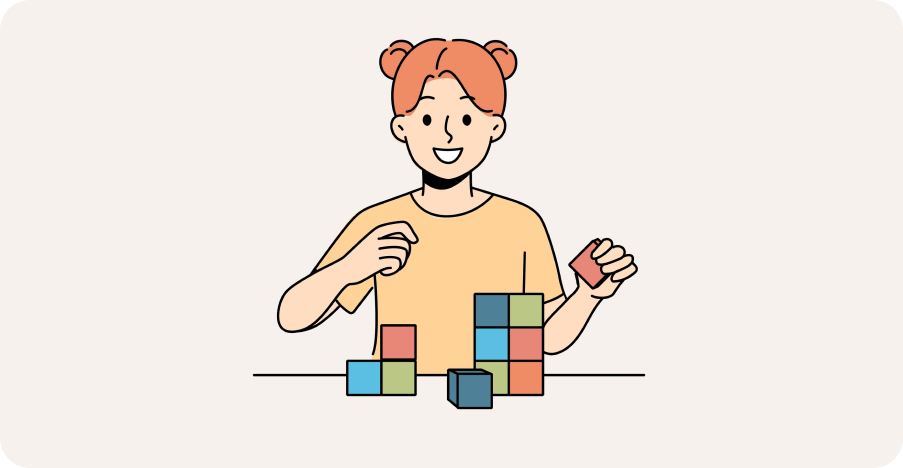Start Occupational Therapy Today
with a DrSensory Featured Occupational Therapist
Looking to begin occupational therapy for yourself or your child? Find trusted, licensed Occupational Therapists near you through DrSensory’s exclusive directory. Learn what OT involves, who it helps, and how to connect with a featured specialist today.
What is Occupational Therapy and How Can It Help Children and Adults?
Occupational Therapy (OT) is a patient-centered, evidence-based healthcare service that helps individuals of all ages develop, recover, or improve the skills needed for daily living and working. For children, occupational therapy often focuses on improving fine motor skills, sensory processing, attention, self-care, and play. For adults, OT can assist with rehabilitation after injury, stroke recovery, or managing chronic conditions like arthritis or neurological disorders.
Whether you’re seeking pediatric occupational therapy or adult OT services, DrSensory makes it easy to connect with licensed, highly-rated occupational therapists near you who specialize in your specific needs.

How Do I Find the Right Occupational Therapist Near Me to Get Started?
Finding the right occupational therapist near you starts with understanding your specific goals—whether it’s improving a child’s handwriting and sensory integration or recovering from a hand injury or surgery. DrSensory’s therapist directory lets you search and connect with verified, licensed Occupational Therapists who specialize in your area of need.
You can browse therapist profiles, read about their specialties (like pediatric OT, neurological rehab, or hand therapy), check credentials, and even contact them directly to begin your occupational therapy journey with confidence.

What Conditions or Challenges Does Occupational Therapy Treat?
Occupational Therapy (OT) addresses a wide range of developmental, physical, emotional, and cognitive conditions. Common reasons people seek OT include autism spectrum disorder, ADHD, sensory processing disorder, cerebral palsy, developmental delays, stroke recovery, hand injuries, arthritis, and challenges with daily living skills. Pediatric OTs often help children with motor coordination, handwriting, feeding, or sensory issues, while adult OTs support rehabilitation, mobility, and independence.
DrSensory connects you with Occupational Therapists who specialize in the exact challenges you or your loved one are facing—making it easier to get personalized, effective care.
When Should I Consider Starting Occupational Therapy for My Child or Myself?
You should consider starting occupational therapy if you or your child are struggling with daily tasks like dressing, eating, writing, focusing, or managing emotions. Early signs in children might include poor coordination, difficulty holding a pencil, delayed milestones, or meltdowns related to sensory overload. Adults may benefit after surgery, injury, or diagnosis of a neurological condition.
If you’re unsure, connecting with a DrSensory featured Occupational Therapist for an evaluation can help determine if OT is right for your needs. Early intervention often leads to the best outcomes.

Do Occupational Therapists Work with Schools, Clinics, or Provide In-Home Services?
Yes, occupational therapists work in a variety of settings including public and private schools, outpatient clinics, hospitals, rehabilitation centers, and in-home environments. Some OTs also offer teletherapy or virtual sessions for greater convenience. DrSensory allows you to filter your search based on service setting—so whether you need school-based OT, in-clinic sessions, or therapy in your home, you’ll find a provider who fits your needs.
How Long Does Occupational Therapy Take to Show Results?
The duration of occupational therapy depends on the individual’s goals, diagnosis, and how frequently therapy sessions occur. Some clients see meaningful progress in just a few weeks, while others with more complex needs may benefit from ongoing support over months or years. Therapists continuously assess and adjust treatment plans to ensure progress toward functional goals.
DrSensory’s featured Occupational Therapists offer personalized plans and regular evaluations to keep your therapy journey on track and goal-oriented.

How Much Does Occupational Therapy Cost and Is It Covered by Insurance?
The cost of occupational therapy can vary depending on the provider, location, and whether sessions are in-person or virtual. Many Occupational Therapists on DrSensory accept insurance, including Medicaid, private plans, and school-based funding. Some also offer private pay or sliding scale options for families paying out-of-pocket.
You can easily filter providers on DrSensory by payment type or insurance accepted, making it simple to find high-quality, affordable OT services near you.
Can Occupational Therapy Help with Sensory Processing Disorder or Sensory Issues?
Yes, Occupational Therapy is one of the most effective treatments for children and adults with Sensory Processing Disorder (SPD) or sensory integration challenges. Occupational Therapists use evidence-based sensory integration techniques to help clients better process and respond to sensory input—such as sound, touch, movement, or light.
DrSensory features experienced OTs who specialize in sensory processing therapy and can create personalized plans to support regulation, focus, and improved behavior at home or in school.

What Should I Expect During the First Occupational Therapy Appointment?
During your first occupational therapy appointment, the therapist will conduct a comprehensive evaluation to understand your or your child’s strengths, challenges, and daily routines. This may include standardized assessments, parent interviews, or observations of fine motor skills, sensory responses, or self-care tasks.
After the evaluation, your therapist will create a customized treatment plan with specific goals. DrSensory profiles allow you to preview a therapist’s evaluation approach, specialties, and even read reviews before booking.
Is Telehealth or Virtual Occupational Therapy Effective?
Yes, virtual occupational therapy—also known as OT telehealth—has been shown to be effective for many individuals, especially for consultation, parent coaching, and certain skill-building activities. It’s a flexible option for families who prefer therapy at home, live in rural areas, or need scheduling convenience.
Many DrSensory therapists offer secure teletherapy sessions and specialize in adapting treatment plans for virtual delivery, without sacrificing quality care.
How Do I Choose the Right Occupational Therapist for My Child’s Needs?
Choosing the right occupational therapist involves looking at their experience, specialties, treatment philosophy, and communication style. If your child has specific needs—like autism, ADHD, fine motor delays, or sensory challenges—look for a therapist trained in those areas. DrSensory makes it easy to compare therapist profiles, credentials, specialties, and reviews so you can confidently choose the best fit for your child’s developmental goals.

Can Occupational Therapy Help with Handwriting, Fine Motor Skills, or School Readiness?
Absolutely. Occupational Therapists are specially trained to improve fine motor skills, hand strength, coordination, and visual-motor integration—all critical for handwriting and school success. OT can support children struggling with letter formation, pencil grip, cutting with scissors, and completing classroom tasks independently.
Through DrSensory, you can find pediatric Occupational Therapists who specialize in handwriting remediation, fine motor development, and school readiness, helping your child thrive academically and functionally.

What Do Occupational Therapists Accomplish with Patients?
Occupational therapists aim to support clients in various ways, including:
- Improving daily living skills: Helping patients learn or regain the ability to perform essential daily activities, such as dressing, cooking, and personal hygiene.
- Enhancing motor skills: Working on fine and gross motor skills to improve coordination, strength, and dexterity.
- Promoting cognitive functioning: Assisting clients in developing strategies for memory, attention, and problem-solving tasks.
- Increasing independence: Fostering self-sufficiency in daily activities to enhance overall quality of life.
- Adapting the environment: Modifying home and work environments to remove barriers and ensure safety and functionality.
- Encouraging participation: Engaging clients in meaningful activities to promote social interaction and emotional well-being.
- Managing pain and discomfort: Providing techniques and interventions to help clients cope with pain and improve comfort during activities.
- Supporting mental health: Offering therapeutic strategies to address emotional challenges and promote mental resilience.
What Age Groups Can Benefit from Occupational Therapy?
Occupational therapy is designed to assist individuals across various age groups, each with unique needs and challenges.
Children
Pediatric occupational therapy addresses developmental delays, sensory processing issues, and learning disabilities. Therapists work with children to enhance fine motor skills, improve social interactions, and facilitate participation in school activities and play.
- Infants and toddlers can significantly benefit from occupational therapy for early development support, especially if they encounter delays in developmental milestones.
- Occupational therapy for preschoolers often focuses on developing social skills, self-care activities like dressing and feeding, and pre-writing skills necessary for school readiness. OT helps in enhancing fine motor skills, sensory processing, and overall physical development.
- Children in elementary school can benefit from OT to enhance their cognitive skills, attention span, and academic performance. This includes support for children with learning disabilities, ADHD, and other challenges. For example, occupational therapists can help children develop better handwriting, improve organizational skills, and enhance focus during classroom activities. Communicate with your child’s teachers and occupational therapist to create a cohesive plan that supports their academic and cognitive development both at school and at home.
If your child shows signs of developmental delays, consult a pediatric occupational therapist. Early intervention can make a world of difference in their growth and future abilities.
Adolescents
During the teenage years, occupational therapy can help address issues such as mental health concerns, academic stress, or physical injuries, fostering skills necessary for independence and future transitions into adulthood.
- Teenagers often face stress, anxiety, and social pressures. Occupational therapy can help them develop coping mechanisms, time-management skills, and strategies to handle academic and social demands. Research indicates that teenagers who engage in OT show improved emotional regulation and better academic performance. Encourage your teenager to participate actively in their OT sessions and to practice the skills learned in real-life scenarios. This will reinforce their learning and improve their overall well-being.
Adults
For adults, occupational therapy is beneficial for those recovering from injuries, managing chronic illnesses, or navigating life transitions. Therapists focus on re-establishing functional abilities, improving productivity, and adapting to new challenges in work or personal life. For adults, OT can be beneficial in managing work-related stress, improving ergonomic practices, and adapting to life changes such as parenthood or chronic health conditions. Consider an OT consultation if you experience discomfort or inefficiency in your daily activities, whether at work or home. Small adjustments can lead to significant improvements.
Older Adults
Older adults often face age-related issues such as cognitive decline, limited mobility, or chronic health conditions. Occupational therapy can significantly enhance their quality of life by promoting independence, facilitating engagement in meaningful activities, and implementing strategies to ensure safety at home. Seniors can use occupational therapy to maintain their independence, manage chronic conditions, and improve their quality of life. OT can assist in home modifications, mobility aids, and adaptive techniques for daily living. The National Council on Aging reports that seniors who engage in occupational therapy are more likely to maintain their independence and reduce the risk of falls and other injuries. If you have aging parents, consider OT services that focus on fall prevention and home safety. This can help them stay independent and safe in their own homes.
By tailoring interventions to meet the specific needs of each age group, occupational therapy plays a vital role in enhancing overall well-being and functional capabilities throughout a person’s life.
Is There a Difference Between Pediatric and Adult Occupational Therapy?
Yes, there are significant differences between pediatric and adult occupational therapy, primarily due to the distinct developmental stages and needs of each population. Pediatric occupational therapy focuses on promoting the growth and development of children, addressing issues such as sensory processing, motor skills, and social interactions. Therapists often engage children through play-based activities, making therapy enjoyable while honing essential skills necessary for their age group.
In contrast, adult occupational therapy tends to concentrate on rehabilitation and maximizing independence following illness, injury, or the impacts of aging. Adult therapy typically involves more structured activities aimed at restoring functional capabilities in daily life, workplace environments, or managing chronic conditions. While both fields share the core goal of enhancing individuals’ ability to participate in meaningful activities, the approaches, methods, and focus areas are tailored to meet the varying developmental and functional needs of children and adults alike.
Can Occupational Therapy Help with Workplace Injuries or Rehabilitation?
Absolutely, occupational therapy plays a crucial role in the rehabilitation of individuals who have sustained workplace injuries. Occupational therapists assess the specific needs of injured workers and develop customised treatment plans to facilitate recovery and reintegration into the workplace. This may include exercises to improve strength and flexibility, strategies to manage pain, and education on proper ergonomics to prevent future injuries. Additionally, therapists collaborate with employers to modify job tasks and environments, ensuring that workers can return safely and effectively. By focusing on both physical rehabilitation and the development of coping strategies, occupational therapy supports a holistic recovery journey, ultimately promoting a healthier and more productive workforce.
How Does Occupational Therapy Address Activities of Daily Living (ADLs)?
Occupational therapy plays a vital role in helping individuals perform Activities of Daily Living (ADLs), which are essential for independent living. Therapists assess a client’s abilities and identify specific challenges that may hinder their capacity to complete essential tasks such as bathing, dressing, eating, and mobility. Through tailored interventions, occupational therapists work closely with clients to develop practical strategies and adaptive techniques that facilitate these daily activities. This may involve breaking down tasks into manageable steps, using assistive devices, and creating structured routines that promote confidence and efficiency. Additionally, therapists educate clients on pacing themselves and incorporating energy conservation techniques to manage fatigue. By focusing on ADLs, occupational therapy not only enhances functional independence but also significantly contributes to clients’ overall well-being and quality of life.
Are There Any Complementary Therapies That Can Be Used in Conjunction with Occupational Therapy?
Yes, several complementary therapies can enhance the effectiveness of occupational therapy by addressing different aspects of an individual’s well-being. Integrative approaches may include physical therapy, which focuses on improving movement and strength; speech therapy, which helps with communication and swallowing challenges; and psychological counselling, which provides support for emotional and mental health issues. Other complementary therapies such as art and music therapy can foster creative expression and emotional healing, while mindfulness and relaxation techniques may assist in reducing stress and enhancing focus. By incorporating these therapies alongside occupational therapy, clients are provided with a holistic treatment plan that addresses their physical, emotional, and cognitive needs, ultimately improving their overall outcomes and quality of life.
Can an Occupational Therapist Provide Assistive Devices or Modifications for My Home or Workplace?
Yes, occupational therapists are well-equipped to recommend and implement assistive devices and modifications tailored to meet the specific needs of individuals in their home or workplace environments. After conducting a thorough assessment of the client’s needs, limitations, and the contexts in which they operate, therapists can suggest a range of adaptive equipment, such as grab bars, step stools, or ergonomic furniture, that can facilitate safer and more efficient movement. In addition to recommending devices, occupational therapists can also advise on environmental modifications, such as rearranging furniture for optimal accessibility or implementing adaptive technologies that support daily tasks. Their expertise ensures that these solutions not only enhance safety and functionality but also promote independence, allowing clients to engage more fully in their daily activities at home or work. By collaborating closely with clients, families, and employers, occupational therapists play a pivotal role in creating supportive environments that cater to individual needs and enhance overall quality of life.
What Age Should a Child Start Occupational Therapy if They Show Developmental Delays?
Children can start occupational therapy as early as infancy if delays or challenges are identified. Early intervention (birth to age 3) is often the most effective time to address motor, sensory, feeding, or self-regulation delays. Preschool and school-age children can also benefit significantly from OT when challenges in attention, motor skills, or behavior affect daily life.
DrSensory connects you with Occupational Therapists experienced in early intervention and developmental support, so your child can receive help during their most critical growth years.
Do I Need a Doctor’s Referral to Start Occupational Therapy?
In many states and situations, you do not need a doctor’s referral to start occupational therapy—especially for private-pay or telehealth services. However, if you plan to use insurance or Medicaid, a physician referral or prescription may be required for reimbursement.
DrSensory makes it easy to find therapists who accept direct referrals or can help you navigate the referral and insurance process based on your location and funding source.
Are There Any Privacy Concerns with Receiving Occupational Therapy Services Online?
Yes, privacy concerns are an important consideration when engaging in online occupational therapy services. Since these sessions often involve sharing personal health information and discussing medical conditions, ensuring that the platform used is secure and compliant with health privacy regulations, such as HIPAA (Health Insurance Portability and Accountability Act), is crucial. Most reputable online therapy platforms implement encryption protocols, secure servers, and strict privacy policies to protect patient data. Additionally, it is vital for patients to be aware of how their information is stored, who has access to it, and the measures taken to safeguard it from unauthorized access. Patients should feel empowered to ask their therapists about privacy practices and to voice any concerns regarding the confidentiality of their information. Overall, while online occupational therapy can offer convenience and accessibility, ensuring the protection of personal health data remains a top priority.
Be Seen. Get Booked. Grow Your Therapy Practice with DrSensory.
Join the only directory built exclusively for Physical, Occupational, and Speech Therapists. Boost your visibility, attract more patients looking for your care, and showcase your expertise with a searchable, SEO-optimized profile that works for you 24/7. Perfect for private practitioners, new grads, and clinic-based therapists.











































































